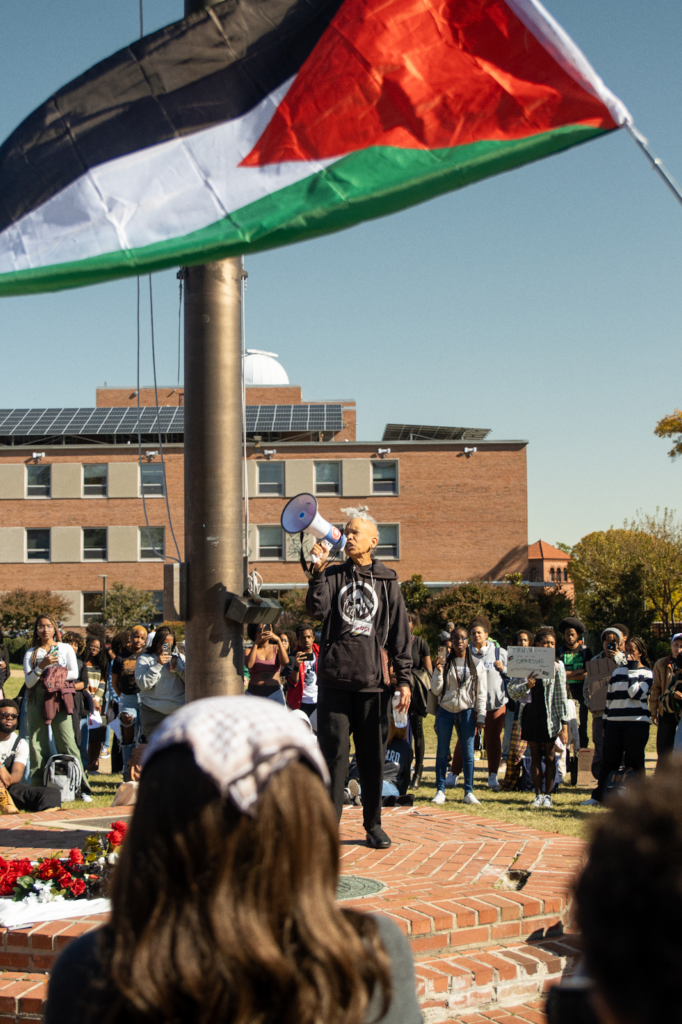More than 100 students gathered around the campus flagpole on two separate days last week to protest Israel’s bombardment of Palestinians in Gaza.
Students from Howard University Students for Justice in Palestine and DMV chapter of Students for Socialism organized a vigil on Oct. 23 to pay respects to Palestinian lives lost in Israel’s attack, and a walkout on Oct. 25 to express their dissatisfaction with the U.S. and, purportedly, Howard’s aid to Israel’s apartheid state. Students on the Yard advocated for a “liberated” Palestine.
Some students held signs that read “End Genocide Now” and “HU Students for Palestine,” while others wore Palestinian flags on their backs or shirts that read “End Apartheid.”
The students also engaged in various chants on the Yard in support, yelling, “Free Free Palestine,” “Long Live Palestine” and “Not in Our Name.”

Hamas, a Palestinian militant group, attacked Israel on Oct. 7, which has now evolved into a wider conflict between Israel and Gaza. Students and universities across the country are taking a stance on the developing conflict between Israel and Gaza, showing support for Palestinians, Israelis or both.
Since the attacks, more than 1,400 Israelis have been killed as of Oct. 9, and more than 8,000 Palestinians have been killed as of Oct. 29, according to Al Jazeera.
President Joe Biden met with Israel Prime Minister Benjamin Netanyahu on Oct. 18 to express the United States’ support of Israel during the conflict between them and Hamas but also emphasized the need to increase humanitarian aid to Gaza.
Tatyana Hall, a freshman biology major from Philadelphia, said her Armenian background allows for a deeper understanding of the situation in Gaza. The Armenian genocide is an ongoing massacre of the Armenian people since 1915, according to Yale University’s Genocide Studies Program.
“Being Armenian, I am a product of genocide already,” Hall said. “It is very important to stand in solidarity with Palestine, especially knowing how it feels to be a product of ethnic cleansing, but also just standing in solidarity with people being oppressed no matter what your identity is.”
Hall also said that the conflict between Gaza and Israel did not start on Oct. 7, and has been ongoing since 1948, which the Council on Foreign Relations outlines.
Jenna Elmasri, a junior finance major from Washington, D.C., being Palestinian herself, made it a priority to attend events organized by Students for Justice in Palestine.
“I am 100 percent Palestinian. I am a first-generation American, so my parents are Palestinian immigrants who know exactly where they come from,” Elmasri said. “Last summer I spent three months in Palestine, and in order to get there my family and I got smuggled through Israel, basically the daily life of Palestinians.”
Elmasri believes in the importance of Black students who attend HBCUs to speak out for Palestinians.
“When you are a student at an HBCU you are saying ‘f**k you’ to white supremacy in its most raw form. You are denying your education to be in the hands of settler colonists and in the hands of white people,” Elmasri said. “That’s why when you come to an HBCU you are actively being taught and educated by Black and brown people, there is a firm grasp on your education so it‘s not manipulated to fit the narratives of others.”
Elmasri said that slavery resulted in a diaspora that impacted Black people’s connections to their homelands and native culture and that Palestinians today are in the initial stages of diaspora because of this conflict.
Black people, she said, “are so involuntarily disconnected from their roots against their own will because it has been stripped from them, and that is what is happening to Palestinians now. In centuries, we will be in the exact same position of diaspora as African Americans are today.”
Peyton West, a senior political science major and Spanish minor from Twin Cities, Minnesota, said she felt compelled to attend the walkout to show her support for the Palestinian people.
“As a Black person, you know we know what it’s like to resist occupation and resist oppression,” she said. “And that should be the least that we do is to just come out to a rally and voice our support for Palestinian people.”
West also shared her disappointment of the university’s “lack of response.”
“As a university that says they stand for Black liberation and Black empowerment. It really is disappointing to see, then when something is happening to Black and brown people, they don’t want to take a stance because we’re backed by the U.S.,” she said.
Aaron Booe, senior political science major, economics minor from Austin, Texas and youth organizer with the Claudio Jones School for Political Education expressed similar disappointment with the university’s silence on the ongoing conflict between Israel and Gaza.
“I’m very disappointed in the fact that Howard has not issued a statement as an HBCU, despite the very long history of shared struggle between Palestinian people and African American people,” he said.
He strongly encouraged students to challenge the administration and student organizations to speak out.
The university emailed a statement to The Hilltop on Oct. 25 in response to last week’s walkout. The statement said “Our hearts have ached for the innocent children and adult victims of targeted hate…” and “we pray for an end to this conflict and personal suffering of the Israeli and Palestinian people because violence and hatred must never be tolerated.”
The statement encouraged students to engage in dialogue and constructively express differing perspectives and opinions.
“I believe collegiate students have a responsibility to organize on their campuses. Like I previously said, we need to be calling out administration,” Booe said. “We need to be organizing to get our student associations to issue statements that make it very clear.”
Copy edited by Alana Matthew

























